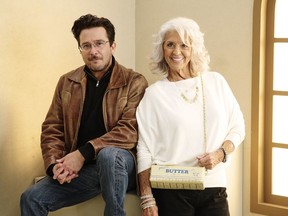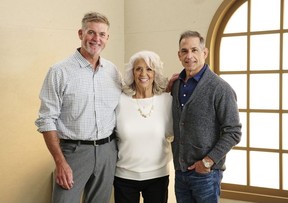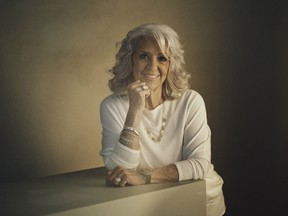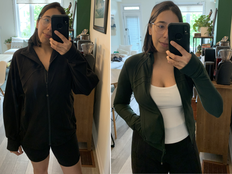TIFF 50: Paula Deen isn’t here to ‘convince y’all’ that she’s not a racist

Article content
Reviews and recommendations are unbiased and products are independently selected. Postmedia may earn an affiliate commission from purchases made through links on this page.
Paula Deen knows you might think of her as a racist.
The celebrity cook surprised an audience gathered Monday afternoon at the Toronto International Film Festival by appearing in person after a screening of “Canceled: The Paula Deen Story,” a new documentary revisiting the 2013 racism scandal that derailed her career. Many people remember Deen admitting to having previously used the n-word, which spiraled into her losing her Food Network show and several brand partnerships. In Toronto, where she wore a sparkly crossbody purse shaped like a giant stick of butter, she said there is more to know about the situation.
“I’m not standing here to try to convince y’all that I am not a racist. I am not here for that,” she stated, standing between her two sons. “But I am here to give this opportunity for y’all to watch and make up your own mind about this.”
Her words echoed those of director Billy Corben, who told The Washington Post in a separate interview Sunday that he decided to make the documentary, which doesn’t yet have distribution, so people could form an educated opinion about the so-called cancellation of a onetime television darling. “If people think the punishment fit the crime, so be it,” he said. “But at least understand what happened.”
He added, “This is somehow the most controversial person I’ve ever documented.” His previous subjects include Miami drug smugglers (“Cocaine Cowboys”) and mercenaries who stage a failed attempt to overthrow the Venezuelan government (last year’s “Men of War”).
Corben knew broadly of Deen when a producer approached him with the idea to revisit her scandal, but he didn’t know the details of the incident. He started polling friends to see what they could recall and, after conducting some research, discovered that many people were “not remembering it correctly.” There seemed to be this image of her “running around the kitchens at her restaurants with a cleaver, dropping n-bombs at her staff,” he said, when that isn’t what was alleged.
The controversy began in 2013 when Deen and her younger brother, Earl “Bubba” Hiers, were sued by a restaurant manager named Lisa Jackson, who is White, over accusations of racism and sexual harassment. Deen was asked in a deposition whether she had ever said the n-word, to which she responded, “Yes, of course.” She said she probably used it while relaying to her first husband how “a black man burst into the bank that I was working at and put a gun to my head.”
Had she used the slur since then? “I’m sure I have,” she said, “but it’s been a very long time.”
The discrimination suit was settled within a few months of the deposition, but the damage was done – not only did she lose her cooking show and lucrative brand partnerships with corporations such as Walmart and Caesars Entertainment, but one of her close friends also came out with her own accusation of Deen treating her poorly based on race. Gordon Elliott, a producer on Deen’s show, says in the film that she lost “hundreds of millions of dollars.”
Corben told The Post that he wondered whether he, as a White man, was the best director for this film. Might it have been better for a person of color to revisit a racial controversy? He said he was convinced he could capture the nuance after conversations with his wife “gave me a lot of confidence.”
Bobby Deen, the younger of Deen’s two sons, wondered whether anyone should be directing such a film. Before he decided to sign onto the project, Corben went on a tour of Savannah, Georgia, with Deen and her sons. Bobby drove them around for the day and remained relatively quiet, Corben recalled. Then, the filmmaker asked Bobby what he thought of his family participating in the project.

“He’s like, ‘Absolutely not. We should not be doing this. I don’t think this is a good thing,'” Corben said.
Bobby’s outburst caught the filmmaker by surprise, as Deen and her older son, Jamie, had been loquacious and enthusiastic about the prospect of a documentary. It confirmed to him that the film shouldn’t just be about Deen’s controversy, but also about how the family was impacted: “I’m just like, ‘Okay, I get it now. It’s the restaurant. It’s Lady and Sons. That’s the story,'” Corben said, referring to the Savannah restaurant that made Deen famous. It shuttered in July.
At the Toronto screening, Bobby described the documentary as accurate and fair.
“Was I right about whether or not it was a good idea? I don’t know,” he said. “I didn’t want to go through it all again. I didn’t want my mom to go through it all again. But … it’s what she wanted. And everything that we’ve done, we’ve done together as family.”
“Canceled” aims to contextualize the scandal by filling out lesser-known bits of Deen’s personal history. The film notes that she lived through the racial integration of her high school in Albany, Georgia, which began there in her senior year. It includes a clip of her 2012 episode of the genealogy series “Who Do You Think You Are?,” which confirmed that she descended from a enslaver family.
Corben includes commentary in the film from Michael Twitty, a Black and Jewish culinary historian whose open letter to Deen went viral in 2013. He is the most critical voice of those on camera, saying he wasn’t surprised by what the deposition revealed. Corben also interviews Deen herself, as well as her husband, Michael Groover, and sons Jamie and Bobby. He speaks to Hollis Johnson, Deen’s longtime driver and bodyguard, whom she has said she considers a son. Months before the deposition, Deen invited Johnson onstage at a public discussion of slavery and the Civil War, where she said that he was “as Black as this board,” referring to a dark backdrop at the venue.
This incident is not mentioned in the film. Instead, Johnson challenges accusations against Deen and notes that she and her husband gave him the money to launch a limousine business.

Although Corben said he spoke to restaurant employees about working for Deen, their perspectives do not figure into the film. He does include footage from Deen’s Food Network show of her former friend and colleague Dora Charles, a Black woman who helped open and develop recipes for Lady and Sons – and later accused Deen of mistreatment while speaking to the New York Times.
Charles declined to be interviewed on camera for “Canceled,” but she allowed Corben to write in a title card that she still stands by what she told the Times about Deen in 2013. He tried to get in touch with Jackson, the White employee who sued Deen and her brother, but he never received a response. “I don’t know if any of the numbers or emails were working,” he said.
Early reviews from Toronto accused “Canceled” of providing too many excuses for Deen’s behavior; Corben told The Post that is not the intention of his documentary. The Hollywood Reporter asserted that the film “falls short of a thoughtful critique of cancelation,” while Rolling Stone wrote in a review that “the questions that are left unasked and the things that are curiously left unsaid … make you wonder what the doc is trying to accomplish, exactly.”
“I’m not going to solve racism and gender discrimination in 104 minutes,” Corben said. “I’m not doing to do it. And it’s certainly not Paula Deen who’s going to do it.”
He sees “Canceled” as a launchpad for real-life conversations about racism and cancel culture as a whole. “It’s so loaded,” he said of the latter term, which became more popular in the years that followed Deen’s scandal. There are many questions to ponder: Is it fair to “cancel” someone without giving them room to learn and improve? Does Deen deserve such grace? Why are celebrities so often scrutinized to the same – if not a greater – extent than elected leaders?
“In our country … we ascribe such omnipotence to rich or successful people or celebrities, where they suddenly have to be experts on everything,” Corben said. “I know a lot of rich, successful people who are barely experts in the area that they became rich and successful in.”
This was true in 2013 and remains true today, he said. What did evolve are the circumstances prompting the public to demand certain moral stances from the public.
“Take the exact same set of facts from 2013 and have the Paula Deen scandal occur in 2025 – I think there is a very different outcome,” Corben said. “For better or worse.”












Postmedia is committed to maintaining a lively but civil forum for discussion. Please keep comments relevant and respectful. Comments may take up to an hour to appear on the site. You will receive an email if there is a reply to your comment, an update to a thread you follow or if a user you follow comments. Visit our Community Guidelines for more information.